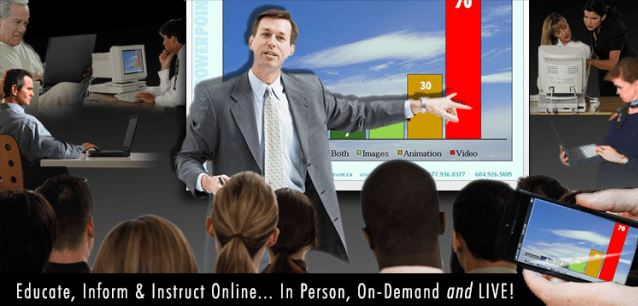
Acknowledge your Online Audience:
Don’t let them feel left out. At the very onset, when starting the event, get the announcer to make eye contact with the camera and welcome the online audience who will be viewing your event over the internet. Make them feel part of the event – which they certainly are. This introduction can also be used to invite them to post their questions and comments on the Interactive Chat Screen if one is available.
Reference Projection Screens During the Webcast:
During presentations, do not use vague references such as “over here”, or “next to that” when using a laser pointer, but instead use precise references relative to the digital content being projected on a screen – for example, “as you can see on the blue line on this graph” or “on bullet two of this slide”.
Let the Camera See You at All Times:
Using a podium or table is useful and gives the best results. However, walking around is fine as long as long as you stay in a well lit area where the camera can see you – do not wander into poorly lit areas of the venue and avoid excessive walking up and down as it makes it difficult for the camera person to track you effectively.
Also avoid excessive body movement like swaying and be conscious of your body language – make sure you behave as if you can always be seen.
On Using a Microphone:
Pre-stream sound checks are crucial. Before the event starts, technicians may ask you to speak into the microphone so they can set audio levels. Make sure you speak the same way that you would while giving your presentation. Do not tap or blow on the microphone – only amateurs do that!
Enunciate clearly – do not speak in a low or muffled tone since the mic may not be able to pick up low audio.
Place lapel microphones on your lapel or tie, or on the outside of your clothing, well away from any jewelry.
If using a podium mic, do not wander away from the podium at any time and remember to keep your mouth pointed towards the mic head, especially when glancing away from the audience towards the projection screen.
Keep hand-held microphones directly under your mouth.
Remember to turn on or turn off the mute on the microphone before the start of the presentation – conversely remember to mute the mic when finished with your presentation to the mic does not pick up any unwanted “hot-mic” comments or private conversations. Do not make “non-presentation” comments until the technician informs you that the recording/broadcast has concluded.
Audience Questions & Feedback:
It is best to inform the local audience to save their questions for the end of each presentation.
Make sure you ask the local audience to use a microphone or, if an audience mic is unavailable, get the presenters to clearly repeat the question so that the online audience can hear what is going on. The same goes for online audiences who generally make comments on a Chat screen (if available). Have your event moderator note down the online questions and hand them to you after your presentation has concluded.
Get Consent:
It is the responsibility of the organizer of the event to inform and gain consent from all the presenters for their online participation. It is also advisable to inform the audience attending locally that they may be on camera, especially when asking questions of the presenters.
